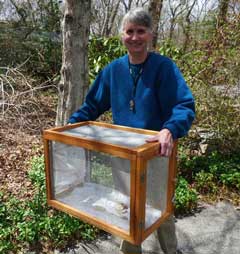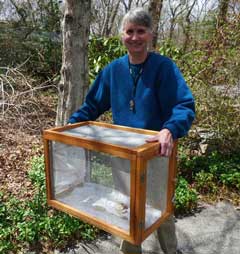 KINGSTON, R.I. – June 3, 2014 – A scientist from the University of Rhode Island’s Biocontrol Lab released thousands of parasitic flies last month in an effort to combat an invasive moth that is defoliating trees throughout the state.
KINGSTON, R.I. – June 3, 2014 – A scientist from the University of Rhode Island’s Biocontrol Lab released thousands of parasitic flies last month in an effort to combat an invasive moth that is defoliating trees throughout the state.
Heather Faubert, coordinator of URI’s Plant Protection Clinic, says that the caterpillars of winter moths, which are native to Europe and arrived in Rhode Island in the last decade, have been found this year in large numbers in many of the state’s coastal communities, as well as in inland areas like Lincoln and Cumberland.
Because the moths have no known predators in the region, Faubert has worked with colleagues at the University of Massachusetts to rear and release a parasitic fly, Cyzenis albicans, that has successfully reduced the moth population in Nova Scotia, where the moths were first found in the 1950s. The fly lays its eggs on tree leaves, and when the moth caterpillar eats the leaves, it ingests the eggs, whereupon the fly larva grows inside the caterpillar and consumes it from the inside.
“I’ve been working on this project since 2005 when our winter moth populations were quite low,” said Faubert. “You need large populations of the moths for the flies to do their job, so I spent several years scouting around the state looking for large moth populations.”
Faubert released about 1,600 parasitic flies at Goddard Park in East Greenwich in 2011, followed by releases in Bristol and Jamestown in 2013 and in South Kingstown, Cumberland and Jamestown last month. It takes several years for the fly population to establish itself in an area to make a noticeable impact on moth numbers.
In Rhode Island, Faubert’s greatest concern is for commercial growers of apples and blueberries. “The moth eggs begin hatching around the middle of April, when there is very little food for them, so they crawl into buds and begin feeding until the bud opens,” potentially destroying an entire crop, she said. The first report of winter moth caterpillars in Rhode Island came from a Warwick blueberry grower in 2004, and Faubert has been advising commercial growers about the threat ever since.
“More and more commercial growers are being affected, so I tell them that they should spray insecticide earlier in the season than they normally would,” Faubert said.
Rhode Island homeowners are increasingly noticing the effect of the caterpillars this year, too. They have flooded the phone lines at the Rhode Island Department of Environmental Management, the URI Master Gardener Hotline, and the Rhode Island office of the Natural Resource Conservation Service with questions. In addition to observing defoliation of maple, oak, birch, and hickory trees, they are reporting large quantities of caterpillar droppings on their cars and decks.
Faubert said there is little that homeowners living near forests can do to fight the effects of winter moths until the parasitic flies control them, but prized landscape trees away from forest edges can be protected by the application of a safe insecticide in early May once the trees have leafed out. She recommends using spinosad insecticides such as Entrust, Conserve or B.t. (Bacillus thuringiensis).
“The caterpillars have been feeding since the middle of April, but people didn’t start noticing them until very recently when they had grown large and were eating a lot,” said Faubert. “They are now dropping into the soil, where they’ll remain until November when the moths emerge.”
She plans to continue releasing the parasitic flies at different sites around the state for several more years.
“Hopefully within about five years the population of flies will increase and they’ll take care of the problem.”
Pictured above
URI’s Heather Faubert prepares to release parasitic flies to control invasive winter moths. (Photo by Richard Casagrande)

